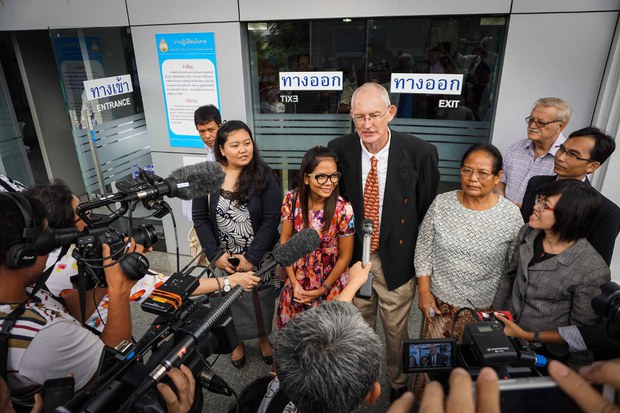Thai Court Acquits Phuketwan Journalists
2015.09.01
 Phuketwan editors Chutima Sidasathian and Alan Morison (third and fourth from left) face the press outside the Phuket Provincial Court building, Sept. 1, 2015.
Phuketwan editors Chutima Sidasathian and Alan Morison (third and fourth from left) face the press outside the Phuket Provincial Court building, Sept. 1, 2015.
A court in southern Thailand on Tuesday acquitted two local journalists of defamation charges brought by the Thai navy, in a case with implications for press freedom in the kingdom that attracted international interest.
Chutima Sidasathian and Alan Morison, editors of the Phuketwan website, were found not guilty of criminal defamation and breaching Thailand’s Computer Crimes Act for including a 41-word excerpt from a Reuters news report within an article published by the Phuket-based site in July 2013.
The Phuket Provincial Court ruled that the controversial excerpt, which linked the Royal Thai Navy to human trafficking, did not qualify as criminal defamation because the defendants had merely reproduced the words of another news organization, and there was no proven intent to defame the navy.
In addition, the Computer Crimes Act was not intended to be used in such cases, the court said in handing down the verdict.
The two defendants had been charged under the act for disseminating the alleged defamatory content via the internet.
“The news presented by the Reuters news agency does not appear to be false or constitute to causing panic or affecting national security,” a Reuters report quoted provincial Judge Chaipawat Chaya-anandpat as saying when he read out the court’s decision.
‘Victory for common sense’
Had the court convicted them of both charges, Chutima and Morison could each have faced seven years in prison.
The ruling was “a victory for common sense and the Thai justice system,” Morison, who is Australian, told BenarNews.
“We hope this represents the start of a more mature approach between the military and the media in Thailand. This was a case brought by a couple of naval officers using a bad law, when a phone call would have solved the problem on the same day,” he said.
“Persecuting the media is not the answer. Being more open about what is happening, and working with the media, is the answer.”
When the judge delivered the verdict, Chutima collapsed in her mother’s arms.
“This is really an important day for the Thai justice system,” Chutima told BenarNews later.
Phuketwan (“sweet Phuket), a small and independent news operation co-founded by Morison and Chutima, had covered the issue of human trafficking in Thailand and the plight of Rohingya Muslims from Myanmar for years before the navy took their publication to court over the July 2013 article.
Morison said he had spent a significant portion of his life savings on legal bills in defending the case, and that he and Chutima would now have to figure out Phuketwan’s future.
Reuters was not charged in this case, but the excerpt in question came from a report from the worldwide news agency, which was part of an investigative series on human trafficking in Southeast Asia that earned it a Pulitzer Prize last year.
“We are pleased at the court’s verdict in the case today as Reuters wholeheartedly supports the principles of a free press, and the imperative of journalists across the world to publish independent and reliable news,” company spokesman David Crundwell told reporters from Reuters in an email.
Prosecution absent again
The prosecution now has 30 days to appeal the court’s ruling, but lawyers for the plaintiffs did not appear at Tuesday’s session.
After showing up for the first day of the three-day trial in July, the prosecution declined to question Chutima and Morison on the witness stand on the second day and lawyers representing the navy didn’t even appear in court on the third day.
Kingsley Abbott, an adviser with the International Commission of Jurists (ICJ), was among many international observers who were in the courtroom for the verdict.
“Certainly it’s a very welcome verdict, one in the right direction for Thailand. We hope that the prosecution does the right thing and decides not to appeal this case,” he said.
Afterwards, the Committee to Protect Journalists (CPJ) issued a statement from Bangkok.
"CPJ is relieved by today's court decision to drop criminal charges against Alan Morison and Chutima Sidasathian," said Shawn W. Crispin, CPJ's senior Southeast Asia representative.
"Authorities should follow up on today's verdict by scrapping the draconian laws, including the Computer Crime Act, that are too often abused and misapplied to threaten reporters and stifle free speech."







